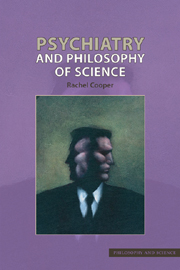Book contents
- Frontmatter
- Contents
- Acknowledgements
- 1 Introduction: psychiatry and philosophy of science
- 2 The nature of mental illness 1: is mental illness a myth?
- 3 The nature of mental illness 2: if mental disorders exist, what are they?
- 4 Explanations in psychiatry 1: natural-history based explanations
- 5 Explanations in psychiatry 2: individual case histories
- 6 Relations between theories 1: when paradigms meet
- 7 Relations between theories 2: reductionisms
- 8 Managing values and interests 1: psychiatry as a value-laden science
- 9 Managing values and interests 2: big business and judging treatments
- 10 Conclusion
- Notes
- Further reading
- Bibliography
- Index
7 - Relations between theories 2: reductionisms
- Frontmatter
- Contents
- Acknowledgements
- 1 Introduction: psychiatry and philosophy of science
- 2 The nature of mental illness 1: is mental illness a myth?
- 3 The nature of mental illness 2: if mental disorders exist, what are they?
- 4 Explanations in psychiatry 1: natural-history based explanations
- 5 Explanations in psychiatry 2: individual case histories
- 6 Relations between theories 1: when paradigms meet
- 7 Relations between theories 2: reductionisms
- 8 Managing values and interests 1: psychiatry as a value-laden science
- 9 Managing values and interests 2: big business and judging treatments
- 10 Conclusion
- Notes
- Further reading
- Bibliography
- Index
Summary
Within psychiatry, theories at “different levels” can seek to explain and predict the same phenomenon. So accounts of depression are of ered in neurochemical, sub-personal, personal, familial and societal terms. How do such theories fit together? Are they in competition, or might they all be true? What does it mean to say that one theory can be reduced to another?
In this chapter I, i rst, disentangle three distinct questions that reductionists might ask, and then go on to consider which reductionist theses, if any, are plausible in the case of psychiatry.
Three types of reductionism
At the outset we need to distinguish between three different varieties of reductionism:
Metaphysical reductionism. A metaphysical reductionist claims that entities at a higher level are nothing over and above entities at a lower level. So, for example, a crowd is plausibly nothing more than a collection of people. Once the facts about the people and their positions are fixed, so too are facts about the crowd. Within psychiatry, the interesting question is whether the mind is anything over and above something physical. These debates are metaphysical. They have to do with the nature of reality.
Epistemic or explanatory reductionism. An epistemic or explanatory reductionist holds that claims at one level can be reduced to claims at lower levels. So an epistemic reductionist might hold that the science of psychology can be reduced to neurology, for example. This is an epistemic claim. It has to do with human knowledge.
[…]
- Type
- Chapter
- Information
- Psychiatry and Philosophy of Science , pp. 102 - 125Publisher: Acumen PublishingPrint publication year: 2007



